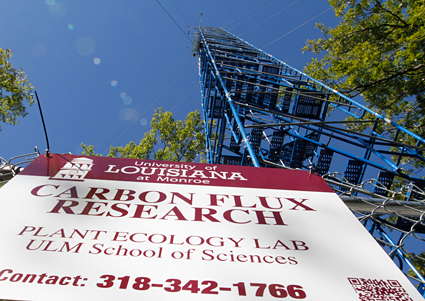Published October 9, 2013
The University of Louisiana at Monroe unveiled its newest tool for ecological research—the
ULM Carbon Flux Tower—capable of continuously monitoring carbon dioxide concentrations
in a large area.
This 120-foot structure is the first of its kind in Louisiana and is located at the
Russell Sage Wildlife Management Area in Monroe.
ULM’s new Carbon Flux Research Tower
“This carbon flux tower will not only put ULM on a national and global map, but the
state of Louisiana as well,” said Dr. Joydeep Bhattacharjee, associate professor of
Biology at ULM.
“The School of Sciences is proud to have one of these research facilities. Such facilities
are usually monitored by Ph.D. granting departments at top-tier institutions such
as Duke University, University of California Berkeley, University of California Davis,
and Harvard University, to name a few. The fact that ULM has joined research in the
ranks of these universities, attests to the potential housed at the university.”
According to Bhattacharjee, “Due to almost continuous forest cover and no major interruptions
by artificial structures, the ‘fetch’ of the ULM tower is excellent, about 2.5 miles
across,” he said.
“The tower is situated close to the center of the management area and is amid large
bottomland hardwood trees. The location of the tower is excellent since it has a large
undisturbed ‘fetch,’ which is an area of forest over which the measurements made by
instruments on the tower are applicable.”
The tower has been outfitted with state-of-the-art sensors positioned both on the
tower and on the ground to allow for continuous monitoring of several variables such
as solar radiation, photosynthetically active radiations, air temperature, rainfall,
rain intensity, wind speed and direction, and soil moisture heat flux.
With the ULM carbon flux tower—constructed by Bleu Skies Tower Inc. in Ruston—Louisiana
becomes the 33rd state to have a continuous monitoring station for carbon dioxide
that is registered with the AmeriFlux Network housed at the Lawrence Berkeley National
Laboratory, at the University of California, Berkeley.
The AmeriFlux network gathers all appropriate and acceptable data from towers across
North and South America for interpretation and application into climate models.
Kenny Ribbeck, the Administrator and Chief of the Biologist Division of the Louisiana
Department of Wildlife and Fisheries said, “Dr. Joydeep Bhattacharjee brings yet another
level of research and understanding to the important role these types of forests play
in maintaining the environment we take for granted,” he said.
“We are looking forward to learning more about our bottomland hardwood forests with
Joydeep and the other ULM professors and students that will be gathering and analyzing
the tremendous amount of data this tower system will be collecting. The Wildlife Management
Area (WMA) system provides an important land base that acts as a hands-on outdoor
classroom, used to provide outdoor recreational opportunities, environmental education,
conservation training and practical scale research opportunities that advance our
understanding of the complex system we have in these bottomland hardwood forests.”
With the tower now operational, teachers from areas schools can bring students to
educate them about the ways in which ecosystem carbon balance is monitored.
Students and teachers will also be able to visit the Plant Ecology Lab at ULM to visualize
the data collected by the ULM tower and the 96 other “active” towers spread across
the country.
“Since there are currently no carbon flux monitoring sites in bottomland hardwood
forests in the nation, the data generated by the ULM tower is going to fill a major
gap in the understanding of ecosystem level carbon exchange in bottomlands,” Bhattacharjee
continued.
ULM graduate student Jared Streeter of Bastrop, a plant ecology lab member, is currently
working with Bhattacharjee on the project. He is conducting vegetation surveys in
the area using the protocol set forth by Terrestrial Carbon Observation Panel of the
Global Terrestrial Observing System Program, to complement data from the tower.
“Since this is the only tower in the region, including adjoining states of Mississippi
and Arkansas, ULM will be in a position to allow scientists from various institutes
of higher education to collaborate and provide a platform for carrying out cutting-edge
research,” said Bhattacharjee.
Bhattacharjee plans to add another important sensor on the tower that will measure
methane, a potent greenhouse gas associated with wetland areas.
“The future of C-flux research at ULM is great and this is just the beginning,” he
said.
“Methane sensors that can be deployed on remote towers like this are a recent invention.
Currently, we know very little about the amount of methane that these bottomlands
generate during periods of the year when the ground is totally flooded. By quantifying
the amount of methane along with carbon dioxide, we can begin to put the pieces of
the puzzle together and get a much better idea on the functioning of these unique
ecosystems.”


